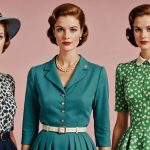How UK Fashion Trends Empower Women’s Self-Expression and Confidence
In recent years, UK fashion trends have embraced inclusivity, reflecting a broader spectrum of identities and styles. This shift empowers women to explore self-expression beyond traditional boundaries. By adopting trends that celebrate diversity, women discover fresh ways to connect fashion and identity, reinforcing their women’s confidence.
Experts agree that fashion serves as a powerful medium for personal empowerment. Dr. Emily Roberts, a leading fashion psychologist, explains that when women curate unique looks aligned with their personalities, it heightens their self-esteem. This connection between style and self-worth transforms clothing from mere fabric into an empowering statement.
Also to see : How do seasonal fashion trends affect women’s mood in the UK?
Moreover, the evolving landscape encourages individualism rather than conformity. British street style and designer collections increasingly highlight eclectic blends that allow women to tell their story visually. This promotes a sense of pride in one’s uniqueness, making fashion a dynamic tool for growth. In summary, the synergy between UK fashion trends and personal identity cultivates confidence, affirming fashion’s role as more than aesthetic—it’s a vehicle for self-expression and empowerment.
Psychological Benefits Linked to Participating in Fashion Trends
Engaging with fashion trends offers notable psychological benefits, closely linked to improved mental wellbeing. Clothing choices have a profound connection to mood; wearing preferred styles often boosts confidence and creates a sense of identity, which is especially important for women’s mental health. Studies consistently show that selecting outfits aligned with current trends can reduce feelings of anxiety and depression by fostering self-expression and social connection.
In the same genre : How Does One Measure the Impact of Wellness Trends on UK Women’s Fashion?
Fashion routines serve more than an aesthetic function; they create daily structure, which is critical for maintaining positivity. For example, planning outfits can give a sense of control and normalcy, counteracting the unpredictable nature of stressful days. This structured approach can enhance resilience, helping women manage emotional challenges more effectively.
Research also highlights how participating in fashion trends encourages social engagement, further supporting mental health. Sharing style ideas or receiving compliments increases feelings of belonging. Through this lens, fashion becomes a tool for navigating emotional wellbeing, blending creativity with psychological growth. Ultimately, staying connected to fashion trends is not just about appearance—it’s a meaningful path to bolster mental health and daily happiness.
Inclusive and Body-Positive Fashion Initiatives in the UK
Small
In recent years, inclusive fashion and body positivity have significantly reshaped the UK’s fashion landscape. UK fashion initiatives increasingly prioritize size-inclusive and adaptive collections. These efforts challenge traditional beauty standards by showcasing diverse body types, abilities, and identities, fostering a more welcoming environment.
One prime example is the impact of UK brands launching collections that cater to different sizes and physical needs. These collections not only expand consumer choice but also shift societal norms, encouraging acceptance beyond conventional silhouettes. Studies show that when fashion represents varied bodies, it promotes mental health by validating individual experiences and reducing stigma.
Visibility in fashion plays a crucial role in acceptance. Seeing models of diverse shapes and abilities on runways and campaigns affirms identities, offering a sense of belonging. Brands promoting these values have reported not only improved customer satisfaction but also stronger community engagement. This blend of inclusivity and body positivity marks a vital progression in fashion, reflecting broader social changes and inspiring confidence in individuals across the UK.
Practical Tips for Using Fashion to Support Mental Wellbeing
Discover how mindful choices in clothing can boost your emotional health.
Fashion tips for mental health emphasize curating a wardrobe that truly reflects your personality and values. Selecting clothes that resonate emotionally can transform dressing from a daily chore into an act of self-care. When your clothing aligns with your inner state, it helps foster confidence and positivity.
Colour plays a key role in this process. Wearing hues that uplift your mood, such as calming blues or energizing yellows, directly impacts how you feel throughout the day. Texture and fit also matter: comfortable fabrics and well-fitting garments enhance physical ease, which in turn supports emotional wellbeing.
Beyond personal selection, engaging in fashion tips for mental health includes participating in community activities like clothing swaps or creative styling groups. These interactions encourage connection, reducing feelings of isolation while promoting shared understanding.
Through mindful dressing, you assert control over your self-image and environment. This practice encourages you to view clothing as a tool for reflection and healing, not just appearance. Applying these fashion tips for mental health offers a practical pathway to nurture both your style and your mental wellbeing.
Expert Insights and Resources on Fashion and Women’s Mental Health
Insights from psychologists and fashion professionals reveal the deep ties between style and emotional well-being. Experts emphasize how clothing choices impact self-esteem and mood. For example, some psychologists note that deliberate fashion decisions can nurture confidence, which in turn supports mental health resilience. Stylists often collaborate with clients to build wardrobes that reflect personal identity, boosting a positive self-image.
In the UK, numerous mental health resources cater specifically to women navigating issues related to self-expression and societal pressure. Support groups and workshops tailored to this intersection provide safe spaces for discussion and empowerment. Campaigns raising awareness about fashion psychology UK encourage women to explore how clothing influences their mental states without judgment.
For those seeking deeper understanding, expert opinions advise exploring literature on fashion psychology UK. Books and articles by specialists offer research-backed strategies that illuminate the reciprocal relationship between attire and mindset. Engaging with these resources can equip women with tools to leverage fashion as a medium for mental health care, enhancing personal growth and well-being.










